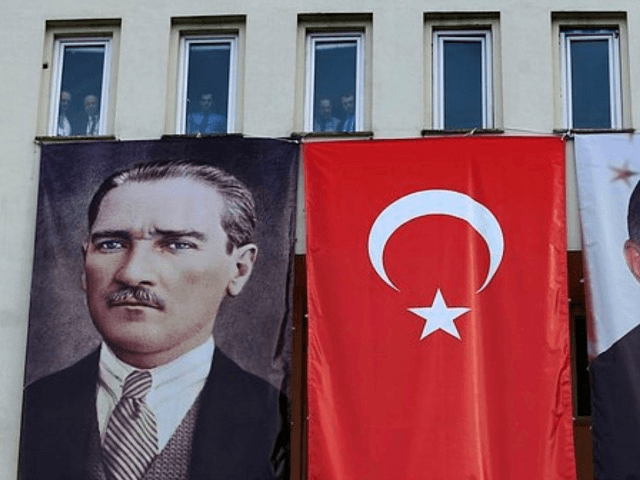Police have arrested a man dressed in traditional Islamic garb who attacked a statue of founder Mustafa Kemal Atatürk in southeast Turkey on Saturday. The man claimed he needed to destroy the statue to adhere to his Muslim faith.
Courts have charged the man, identified as Mehmet Malbora, with “damaging a sculpture that represents Atatürk,” a specific crime in Turkey. Turkey’s legal code also prohibits insulting Atatürk or disparaging his memory in any way.
The Turkish newspaper Hurriyet notes that the incident occurred in the southeastern city of Siverek on Saturday, and that the man attacked the statue while shouting, “There is no idol worshipping in Islam! Are those who protect the idol worshipping descendants of the Prophet?” He allegedly also likened admiration for Atatürk to “paganism.”
Malbora’s family claimed he has a substance abuse problem (the Islamic sharia code bans the use of drugs), while the newspaper described him as a “peddler.” In court, Malbora said he was “told in a dream” to destroy the statue. Police are nonetheless inspecting his computers, phone, and all communication fearing ties to a radical Islamic group, given the propensity of groups like the Islamic State to destroy statues.
Atatürk founded the Republic of Turkey in 1923 following the collapse of the Ottoman Empire in World War I. His rule over the nation was characterized by his enthusiastic embrace of secularism, removing Islam from the political sphere of life and constructing a legal framework independent of sharia law. Atatürk remains widely popular today—particularly among the members of the Republican People’s Party (CHP), the political party he founded—and Turkey still celebrates a holiday in his name: Commemoration of Atatürk, Youth, and Sports Day on May 19.
The Turkish government prosecutes those who make public statements interpreted to insult Ataürk. In July, a man identified as Hasan Akar was sentenced to two and a half years in prison for making a video in which he allegedly used profane language in reference to Atatürk, charged with both “defaming Atatürk’s memory” and “inciting people to hatred and hostility.”
In another recent incident, a magazine editor faced charges of “insulting the memory of Mustafa Kemal Atatürk” after publishing an article claiming to contain the contents of a letter written by a spurned lover of Atatürk’s.
While Ankara continues to curb freedom of expression in the name of Atatürk’s memory, many secularists fear that the administration of President Recep Tayyip Erdogan has given Islam undue influence in the public sphere. Recent changes in public education, for example, will force children to engage more Quranic studies, study more Islamic writers and scientists, and expose them less to Western scientific ideas like the theory of evolution. The new curriculum will also minimize references to Atatürk. Erdogan has also begun the construction of an “international Islamic university” in Istanbul the Turkish government hopes will become an Islamic authority on par with Egypt’s al-Azhar University.
Erdogan’s government has also broken with the rules set by Atatürk regarding the use of the Hagia Sophia, a Christian church that served as a mosque following the Islamic conquest of Constantinople. Following the founding of the Turkish Republic, Atatürk banned all religious activity and converted the Hagia Sophia into a museum. Erdogan has reversed this, allowing Islamic prayers in the history facility and outraging the government of Greece.
Erdogan’s Islamicization of the country has triggered alarming acts of violence throughout the country. Islamists have attacked couples for kissing in public, stormed secular newspaper headquarters chanting “allahu akbar,” and beaten members of the Atatürk youth group known as the “People’s Houses.” In an incident in January, a Muslim mob attacked a group of youths chanting “We are soldiers of Mustafa Kemal” while countering “there is no god but allah.”
Atatürk’s CHP remains the main opposition party to Erdogan’s ruling coalition and has increasingly organized protests against the government. A protest in July attracted one million people, according to CHP leaders.

COMMENTS
Please let us know if you're having issues with commenting.